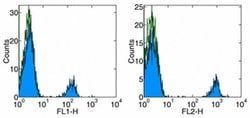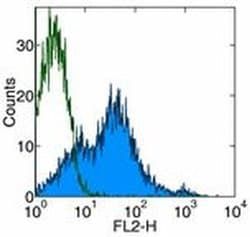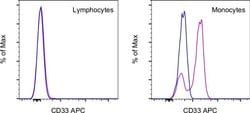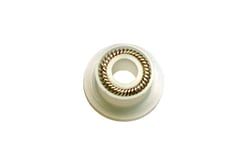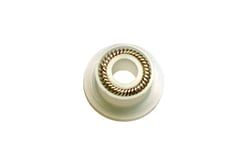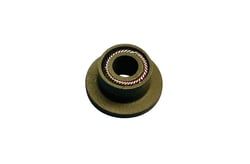50-114-06
CD7 Monoclonal Antibody (eBio124-1D1 (124-1D1)), Biotin, eBioscience™, Invitrogen™
Manufacturer: Invitrogen
Select a Size
| Pack Size | SKU | Availability | Price |
|---|---|---|---|
| Each of 1 | 50-114-06-Each-of-1 | In Stock | ₹ 16,821.00 |
50-114-06 - Each of 1
In Stock
Quantity
1
Base Price: ₹ 16,821.00
GST (18%): ₹ 3,027.78
Total Price: ₹ 19,848.78
Antigen
CD7
Classification
Monoclonal
Concentration
0.5 mg/mL
Formulation
PBS with 0.09% sodium azide; pH 7.2
Gene Accession No.
P09564
Gene Symbols
CD7
Purification Method
Affinity chromatography
Regulatory Status
RUO
Gene ID (Entrez)
924
Content And Storage
4° C, store in dark, DO NOT FREEZE!
Form
Liquid
Applications
Flow Cytometry
Clone
eBio124-1D1 (124-1D1)
Conjugate
Biotin
Gene
CD7
Gene Alias
Cd7; CD7 antigen; CD7 antigen (p41); Cd7 molecule; GP40; LEU-9; p41 protein; T-cell antigen CD7; T-cell leukemia antigen; T-cell surface antigen Leu-9; Tp40; TP41
Host Species
Mouse
Quantity
100 μg
Primary or Secondary
Primary
Target Species
Human
Product Type
Antibody
Isotype
IgG1 κ
Description
- Description: The eBio124-1D1 monoclonal antibody reacts with human CD7, also known as gp40 and Leu9
- CD7, a 40 kD receptor, is a member of the immunoglobulin gene superfamily
- The N-terminal amino acid sequence (aa1-107) is highly homologous to Ig kappa light chain sequence; while the carboxyl-terminal region of the extracellular domain is proline-rich and has been postulated to form a stalk from which the Ig domain projects
- CD7 is expressed on the majority of immature and mature T lymphocytes, and T cell leukemias
- It is also found on natural killer cells, a small suppopulation of normal B cells and on maligant B cells
- Cross-linking surface CD7 positively modulates T cell and NK cell activity, as measured by calcium flux, expression of adhesion molecules, cytokine secretion and proliferation
- CD7 associates directly with phosphoinositol 3'-kinase
- CD7 ligation induces production of D-3 phosphoinositides and tyrosine phosphorylation
- A clonogenic subpopulation of human CD34(+) CD38(-) cord blood cells that express CD45RA and HLA-DR and high levels of the CD7 has been reported
- These cells possess the capacity for lymphopoiesis
- They can generate B-cells, natural killer cells, and dendritic cells but do not possess the capacity to develop into myeloid cells or erythroid cells
- The CD7(+) phenotype distinguishes primitive human lymphoid progenitors from pluripotent stem cells
- CD7 (gp40, Leu9) is a 40 kDa member of the immunoglobulin gene superfamily
- CD7 contains N-terminal amino acids 1-107 are highly homologous to Ig kappa-L chains whereas the carboxy-terminal region of the extracellular domain is proline-rich and has been postulated to form a stalk from which the Ig domain projects
- CD7 is expressed on the majority of immature and mature T-lymphocytes, and T cell leukemia
- Further, CD7 is also found on natural killer cells, a small subpopulation of normal B cells and on malignant B cells
- Cross-linking surface CD7 positively modulates T cell and NK cell activity as measured by calcium fluxes, expression of adhesion molecules, cytokine secretion and proliferation
- CD7 associates directly with phosphoinositol 3'-kinase
- CD7 ligation induces production of D-3 phosphoinositides and tyrosine phosphorylation
- Expression of CD7 is an important marker used in leukemia diagnostics.
Compare Similar Items
Show Difference
Antigen: CD7
Classification: Monoclonal
Concentration: 0.5 mg/mL
Formulation: PBS with 0.09% sodium azide; pH 7.2
Gene Accession No.: P09564
Gene Symbols: CD7
Purification Method: Affinity chromatography
Regulatory Status: RUO
Gene ID (Entrez): 924
Content And Storage: 4° C, store in dark, DO NOT FREEZE!
Form: Liquid
Applications: Flow Cytometry
Clone: eBio124-1D1 (124-1D1)
Conjugate: Biotin
Gene: CD7
Gene Alias: Cd7; CD7 antigen; CD7 antigen (p41); Cd7 molecule; GP40; LEU-9; p41 protein; T-cell antigen CD7; T-cell leukemia antigen; T-cell surface antigen Leu-9; Tp40; TP41
Host Species: Mouse
Quantity: 100 μg
Primary or Secondary: Primary
Target Species: Human
Product Type: Antibody
Isotype: IgG1 κ
Antigen:
CD7
Classification:
Monoclonal
Concentration:
0.5 mg/mL
Formulation:
PBS with 0.09% sodium azide; pH 7.2
Gene Accession No.:
P09564
Gene Symbols:
CD7
Purification Method:
Affinity chromatography
Regulatory Status:
RUO
Gene ID (Entrez):
924
Content And Storage:
4° C, store in dark, DO NOT FREEZE!
Form:
Liquid
Applications:
Flow Cytometry
Clone:
eBio124-1D1 (124-1D1)
Conjugate:
Biotin
Gene:
CD7
Gene Alias:
Cd7; CD7 antigen; CD7 antigen (p41); Cd7 molecule; GP40; LEU-9; p41 protein; T-cell antigen CD7; T-cell leukemia antigen; T-cell surface antigen Leu-9; Tp40; TP41
Host Species:
Mouse
Quantity:
100 μg
Primary or Secondary:
Primary
Target Species:
Human
Product Type:
Antibody
Isotype:
IgG1 κ
Antigen: __
Classification: __
Concentration: __
Formulation: __
Gene Accession No.: __
Gene Symbols: __
Purification Method: __
Regulatory Status: __
Gene ID (Entrez): __
Content And Storage: __
Form: __
Applications: __
Clone: __
Conjugate: __
Gene: __
Gene Alias: __
Host Species: __
Quantity: __
Primary or Secondary: __
Target Species: __
Product Type: __
Isotype: __
Antigen:
__
Classification:
__
Concentration:
__
Formulation:
__
Gene Accession No.:
__
Gene Symbols:
__
Purification Method:
__
Regulatory Status:
__
Gene ID (Entrez):
__
Content And Storage:
__
Form:
__
Applications:
__
Clone:
__
Conjugate:
__
Gene:
__
Gene Alias:
__
Host Species:
__
Quantity:
__
Primary or Secondary:
__
Target Species:
__
Product Type:
__
Isotype:
__
Antigen: __
Classification: __
Concentration: __
Formulation: __
Gene Accession No.: __
Gene Symbols: __
Purification Method: __
Regulatory Status: __
Gene ID (Entrez): __
Content And Storage: __
Form: __
Applications: __
Clone: __
Conjugate: __
Gene: __
Gene Alias: __
Host Species: __
Quantity: __
Primary or Secondary: __
Target Species: __
Product Type: __
Isotype: __
Antigen:
__
Classification:
__
Concentration:
__
Formulation:
__
Gene Accession No.:
__
Gene Symbols:
__
Purification Method:
__
Regulatory Status:
__
Gene ID (Entrez):
__
Content And Storage:
__
Form:
__
Applications:
__
Clone:
__
Conjugate:
__
Gene:
__
Gene Alias:
__
Host Species:
__
Quantity:
__
Primary or Secondary:
__
Target Species:
__
Product Type:
__
Isotype:
__
Antigen: __
Classification: __
Concentration: __
Formulation: __
Gene Accession No.: __
Gene Symbols: __
Purification Method: __
Regulatory Status: __
Gene ID (Entrez): __
Content And Storage: __
Form: __
Applications: __
Clone: __
Conjugate: __
Gene: __
Gene Alias: __
Host Species: __
Quantity: __
Primary or Secondary: __
Target Species: __
Product Type: __
Isotype: __
Antigen:
__
Classification:
__
Concentration:
__
Formulation:
__
Gene Accession No.:
__
Gene Symbols:
__
Purification Method:
__
Regulatory Status:
__
Gene ID (Entrez):
__
Content And Storage:
__
Form:
__
Applications:
__
Clone:
__
Conjugate:
__
Gene:
__
Gene Alias:
__
Host Species:
__
Quantity:
__
Primary or Secondary:
__
Target Species:
__
Product Type:
__
Isotype:
__



